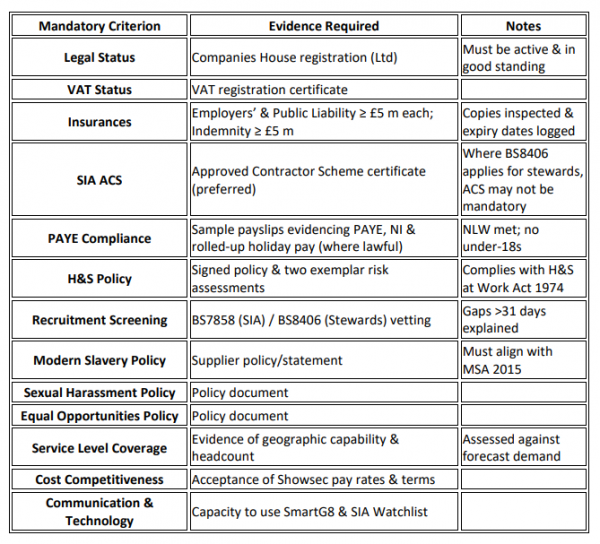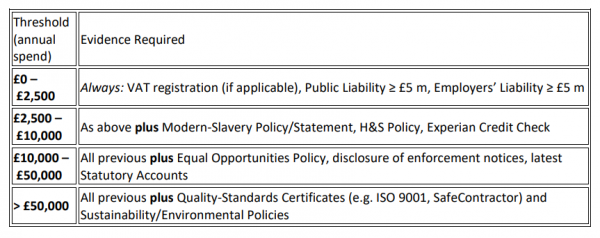Modern Slavery Statement
Introduction
Modern slavery is the illegal exploitation of people for personal or commercial
gain. Victims are controlled by force, threat, coercion, and deception. It can
take various forms, including trafficking of people, forced labour, sexual or
criminal exploitation, or domestic servitude.
At Showsec, we are firmly committed to identifying, preventing, and addressing
modern slavery risks within our business operations and supply chains, including
our third-party labour providers. We expect the same commitment from all our
stakeholders, including suppliers and clients.
Our commitment to transparency, ethical conduct, and compliance with the
Modern Slavery Act 2015 is central to our operations. This document
consolidates our previous Modern Slavery Statement and Modern Slavery and
Human Trafficking Policy into a comprehensive framework. It is available to all
staff and published on Showsec’s company website.
Structure, Business & Supply Chains
Showsec is a market leader in crowd management, operating across a diverse
range of environments, including sports venues, festivals, and corporate events.
Our operations are underpinned by an extensive workforce of over 3,500
stewarding and SIA-licensed security staff, managed by regional and area
managers and supported by our head office departments such as HR, finance,
recruitment, training, IT, and compliance.
Showsec has a structured third-party supply chain. Each company is required to
evidence that they have completed the necessary checks to prevent modern
slavery, illegal working, sexual harassment at work, breaches of health and
safety legislation, as well as compliance with employment law.
To maintain ethical and legal standards, our Resource Planning Team oversees
the collection and review of all supplier compliance documentation, stored in
individual compliance folders. Suppliers are expected to demonstrate adherence
to the Modern Slavery Act 2015, and any failure to meet our standards results in
disqualification from our supply chain.
Additionally, Showsec actively collaborates with industry bodies, such as the
United Kingdom Crowd Management Association (UKCMA) and the City Security
Council, to share best practices and tackle systemic issues, including modern
slavery and human trafficking.
Showsec holds the following accreditations:
• SIA-approved contract scheme (ACS) status for the provision of
security guarding, and door supervision.
• ISO 9001 certification, the internationally recognised
standard for quality management in businesses.
• Recognised by the international institute of risk and safety management (IIRSM)
• Accredited CHAS contractor with a recognised standard of
health and safety management and covers compliance
regarding our field of work.
Responsibility for our modern slavery policy and program sits with our board of directors,
Mark Logan (co-CEO), Simon Battersby (co-CEO), and Stephen Shilling (Finance Director).
Policies
We have several policies that help us manage our modern slavery risk. They enable all staff,
and our suppliers to have a joined-up approach in tackling the threat of modern slavery. In
addition, as part of Live Nation Entertainment, their training, and policies on modern slavery,
business ethics, and whistleblowing apply and are cascaded to Showsec personnel where
this is deemed applicable.
Staff can access our policies on SharePoint or via the SmartG8 app for casual workers. Our
key policies for preventing and reporting modern slavery are:
• Labour Support: Selection & Quality Management Policy
• Procurement Policy
• Corporate Social Responsibility (CSR) Policy
• Whistleblowing Policy
• Code of Business Conduct & Ethics (Live Nation Entertainment)
Risk Assessment and Mitigation
Showsec is committed to minimising the risk of modern slavery within our operations and
supply chains. We assess and manage these risks using dedicated risk assessment
frameworks for both Labour Providers and Non-Labour Suppliers. Each category is subject to
distinct audit programmes and risk matrices, reflecting their risk profiles.
Our risk management procedures are regularly reviewed and updated in line with evolving
best practices, ensuring our supply chain remains robust and resilient against the threat of
modern slavery.
Labour Provider Risk Management Matrix (LPRMM)
This sub-section draws exclusively on the Labour Support: Selection & Quality
Management Policy.

Initial Vetting Process
1. Supplier completes the online JotForm uploading all mandatory
documents.
2. Supply-Chain Manager conducts desk-top due-diligence and scores
Pass/Fail.
3. Senior manager provides secondary approval.
4. Only if every mandatory criterion passes is the supplier added to SmartG8
as Approved.
Auditing & Ongoing Monitoring
Approved labour providers undergo a single annual business audit aligned with SIA ACS
guidance, supported by ad‑hoc spot‑checks of personnel files and twice‑daily SIA Watchlist
licence validation. Non‑conformances trigger a two‑week corrective‑action window; if
unresolved, the provider is suspended from SmartG8 until a successful review audit.
Escalation & Remediation
Persistent failures (e.g. licence irregularities, PAYE breaches, sub-standard conduct) lead to
removal from the approved list and contract termination. All issues and corrective actions
are tracked centrally.
Non-Labour Supplier Risk Management Matrix (NS-RMM)
This sub-section draws exclusively on the Showsec Procurement Policy.
Applicability
This applies to every purchase of goods, services or works over £2,500 or to any lower-value
purchase that presents significant operational, compliance or reputational risk. Labour
providers are governed instead by the LPRMM above.
Minimum Evidentiary Requirements
The Procurement Policy sets mandatory evidence thresholds that scale with annualised
spend. A concise summary is provided below (see Policy for full checklist):

Purchase Orders must be raised in SmartG8 for all spends >£500, with approval routed via
the System of Authority (SOA) levels defined in the Procurement Policy.
Scoring Methodology
For each eligible supplier, the requisitioner completes the NS-RMM spreadsheet, assigning a
1–5 impact score against the following eleven weighted criteria:
1. Cost competitiveness
2. Service-level coverage
3. Ability to meet timeframes
4. Company profile & stability (inc. ethics)
5. Geographical coverage
6. Compliance with relevant regulatory bodies (accreditations)
7. Ease of implementation
8. Communication & technology
9. Innovation & continuous improvement
10. Environmental contribution & compliance
11. Ability to respond to financial requirements
Total scores categorise suppliers as:

Audit & Monitoring Programme
Non‑labour suppliers follow a risk‑proportionate audit cycle – 6, 12 or 24 months depending
on annual spend and inherent risk – to ensure that insurances, policies and certifications
remain current. Audits may be advanced for poor performance, heightened risk or random
sampling, and persistent breaches result in removal from the approved list.
Escalation & Remediation
Failure to meet minimum requirements or to achieve a “Medium” score triggers
corrective-action requests. Persistent non-compliance (e.g. lapsed insurance, ESG breaches,
supply failure) results in removal from the approved list and potential contract termination.
All corrective actions are tracked and reported to the Director responsible for Procurement.
Training and Awareness
To ensure staff and suppliers are equipped to prevent modern slavery, all full-time staff
complete the LNE Code of Business Conduct and Ethics training during induction.
Operations-based managers undergo training through the Management Development
Programme (MDP), ensuring they understand and implement modern slavery prevention
measures.
Casual workers and third-party providers receive tailored training aligned with their roles.
Training initiatives are regularly updated to address new risks and to ensure continuous
improvement.
Effectiveness Metrics
Showsec tracks and reviews the following key performance indicators to measure program
effectiveness:
• Training completion rates: Currently 100% compliance for required staff.
• Supplier audit scores: Results are reviewed quarterly to identify and
address areas of risk.
• Incident reports and grievances: All concerns related to modern slavery or
unethical conduct are logged, categorised, and resolved.
These metrics are evaluated quarterly by the Head of Risk and Operational Compliance, who
reports findings to the Board of Directors. This process ensures accountability and drives
continuous improvement.
Reporting Concerns
Employees, contractors, and stakeholders are encouraged to report any concerns about
modern slavery. Reports can be made through:
• Line managers or HR representatives.
• Anonymous whistleblowing channels available 24/7.
Showsec guarantees that all reports are treated confidentially and investigated promptly.
Looking Forward
We remain committed to continuously improving what we do in this area to reduce the risk
of modern slavery.
Signed:![]()
Mark Logan Co-CEO
Date: 29/04/25